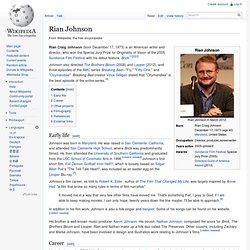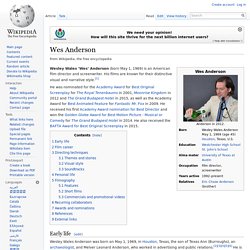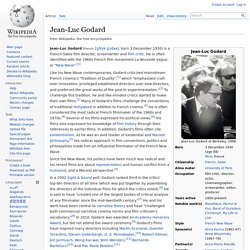

60's Godard Trailers. Rian Johnson. Early life[edit] Johnson's film career, as told to Robert K.

Elder, author of The Film That Changed My Life, was largely inspired by Annie Hall, "a film that broke so many rules in terms of film narrative": It moved me in a way that very few other films have moved me. That's something that, I pray to God, if I am able to keep making movies, I can only hope, twenty years down the line maybe, I'll be able to approach.[6] In addition to his film work, Johnson is also a folk singer and banjoist. Career[edit] The Brothers Bloom, Johnson's second film, is a con-man story starring Mark Ruffalo, Adrien Brody, Rachel Weisz, and Rinko Kikuchi.
Other projects[edit] Wes Anderson. Wesley Wales "Wes" Anderson (born May 1, 1969) is an American film director and screenwriter.

His films are known for their distinctive visual and narrative style.[1] Early life[edit] Wesley Wales Anderson was born on May 1, 1969, in Houston, Texas, the son of Texas Ann (Burroughs), an archaeologist, and Melver Leonard Anderson, who worked in advertising and public relations.[2][3][4][5][6] He is the second of three boys; his parents divorced when he was 8.[6] His older brother, Mel, is a doctor, and his younger brother, Eric, is a writer and artist whose paintings and designs have appeared in several of Anderson’s films.[7] Anderson is of Swedish and Norwegian ancestry.[8] Film career[edit] Anderson's first film, Bottle Rocket (1996), based on a short film that he made with Luke and Owen Wilson, was a crime caper focused on a group of young Texans aspiring to achieve major heists. Following the critical success of Fantastic Mr. Anderson has also created several notable short films. Jean-Luc Godard. Jean-Luc Godard (French: [ʒɑ̃lyk ɡɔdaʁ]; born 3 December 1930) is a French-Swiss film director, screenwriter and film critic.

He is often identified with the 1960s French film movement La Nouvelle Vague, or "New Wave". Like his New Wave contemporaries, Godard criticized mainstream French cinema's "Tradition of Quality", which "emphasized craft over innovation, privileged established directors over new directors, and preferred the great works of the past to experimentation. " To challenge this tradition, he and like-minded critics started to make their own films. Many of Godard's films challenge the conventions of traditional Hollywood in addition to French cinema.[3] He is often considered the most radical French filmmaker of the 1960s and 1970s. Several of his films expressed his political views.
Early life[edit] Early career (1950–59)[edit] Film criticism[edit] In Paris, in the Latin Quarter just prior to 1950, ciné-clubs (film societies) were gaining prominence. Filmmaking[edit]